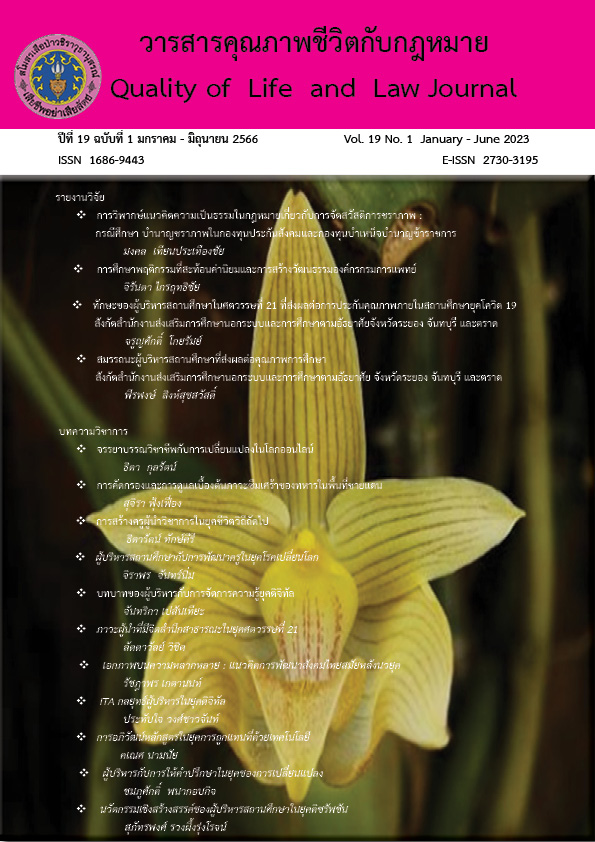Screening and primary care for depression among borderland soldiers
Main Article Content
Abstract
Depression is a common mental health problem among borderland soldiers worldwide and in Thailand as well. Depression is a major problem for Thai borderland soldiers because it reduces the efficiency and effectiveness of their missions. This is caused by stress from financial problems and insecurity in life from performing duties. Thai borderland soldiers need help to address stress and access mental health services. Therefore, depression screening and primary care will be the starting crucial points to solving the depression problems of Thai borderland soldiers. This article aims to present knowledge about the depression screening and primary care of borderland soldiers that can be used by military manpower officers to increase the effectiveness of the depression care operations of borderland soldiers. The required knowledge about depression includes basic concepts and guidelines for screening, treatments, and treatment follow-up. The guidelines for depression screening include screening with the Patient Health Questionnaire (PHQ-2), the Patient Health Questionnaire (PHQ-9), and the Suicide Risk Assessment 8 Questions, and diagnosing depression symptoms and signs with the Diagnostic and Statistical Manual of Mental Disorders, Fifth Edition (DSM-5). The depression treatment guidelines are approaches for medications, psychotherapy, and natural depression treatments. The guidelines of depression treatment follow-up are approaches that use the results of the primary outcome assessment of treatment response, and secondary outcomes assessment of changing behaviors of exercise, sleeping, and eating.
Article Details

This work is licensed under a Creative Commons Attribution-NonCommercial-NoDerivatives 4.0 International License.
- บทความหรือข้อคิดเห็นใดๆ ในวารสารคุณภาพชีวิตกับกฎหมายเป็
- กองบรรณาธิการไม่สงวนสิทธิ์
References
จุไรรัตน์ ทุมนันท. (2565). ผลของการเฝ้าระวังโรคซึมเศร้าด้วยตนเองของประชาชนในชุมชนอำเภอตระการพืชผล จังหวัดอุบลราชธานี. วารสารศูนย์อนามัยที่ 9, 16(2), 659-672.
เทอดศักดิ์ เดชคง ศรัณยพิชญ์ อักษร พาสนา คุณาธิวัฒน์ ขวัญเรือน อัศดรศักดิ์ และธิดารัตน์ ทิพโชติ. (2566). ความสัมพันธ์ระหว่างแบบประเมินพลังใจ ฉบับ 3 ข้อกับการคัดกรองความเสี่ยงปัญหาสุขภาพจิตตามกลุ่มวัย. วารสารสุขภาพจิตแห่งประเทศไทย, 31(1), 52-63.
ธรณินทร์ กองสุข, สุวรรณา อรุณพงค์ไพศาล, ศุภชัย จันทร์ทอง, เบญจมาศ พฤกษ์กานนท์, สุพัตรา สุขาวห และ จินตนา ลี้จงเพิ่มพูน. (2561). ความเที่ยงตรงตามเกณฑ์การวินิจฉัยโรคซึมเศร้าของแบบประเมินอาการซึม เศร้า 9 คำถามฉบับปรับปรุงภาษากลาง. วารสารสมาคมจิตแพทย์แห่งประเทศไทย, 63(4), 321-334.
วิเชียร ศรีภูธร พรหมพิทักษ์ ไหว้พรหม เนตรนภิส จันทวัฒนะ และปิยมาภรณ์ สิงห์คำ (2558). ความชุกของการบาดเจ็บทางสมองภาวะเครียดหลังเกิดเหตุการณ์สะเทือนขวัญและภาวะซึมเศร้าในกําลังพลกองทัพเรือที่ปฏิบัติภารกิจในพื้นที่ชายแดนใต้. วารสารแพทย์นาวี, 42(1), 49-71.
อิศรา รักษ์กุล. (2554). ภาวะสุขภาพจิตและทัศนคติของกำลังพลกองทัพบกที่ปฏิบัติภารกิจในพื้นที่ 3 จังหวัดชายแดนภาคใต้. เวชสารแพทย์ทหารบก. 64(2), 67-74.
Arunpongpaisal, S., Kongsuk, T., Maneethorn, N., Maneethorn, B., Wannasawek, K., Leejongpermpoon, J., et al. (2009). Development and validity of two-question screening test for depressive disorders in Northeastern Thai community. Asian Journal of Psychiatry, 2, 149-152.
Briguglio, M., Vitale, J. A., Galentino, R., Banfi, G., Zanaboni Dina, C., Bona, A., et al. (2020). Healthy eating, physical activity, and sleep hygiene (HEPAS) as the winning triad for sustaining physical and mental health in patients at risk for or with neuropsychiatric disorders:
Considerations for clinical practice. Neuropsychiatric disease and treatment, 16, 55–70.
Department of Veterans Affairs Department of Defense. (2022). VA/DoD Clinical Practice guideline for the management of major depressive disorder version 4. [Internet]. [cited 2023 Mar 26]. Available from: https://www.healthquality.va.gov/guidelines/MH/mdd/ VADoDMDDCPGFinal508.pdf.
Heissel, A., Heinen, D., Brokmeier, L. L., Skarabis, N., Kangas, M., Vancampfort, D., et al. (2023). Exercise as medicine for depressive symptoms? A systematic review and meta-analysis with meta-regression. British Journal of Sports Medicine, 0, 1-10.
Howlett, N., Trivedi, D., Troop, N. A., & Chater, A. M. (2019). Are physical activity interventions for healthy inactive adults effective in promoting behavior change and maintenance, and which behavior change techniques are effective? A systematic review and meta-analysis. Translational behavioral medicine, 9(1), 147–157.
Hruby, A., Lieberman, H. R., & Smith, T. J. (2021). Symptoms of depression, anxiety, and post-traumatic stress disorder and their relationship to health-related behaviors in over 12,000 US military personnel: Bi-directional associations. Journal of affective disorders, 283, 84–93.
Moradi, Y., Dowran, B., Sepandi, M. (2021). The global prevalence of depression, suicide ideation, and attempts in the military forces: a systematic review and Meta-analysis of cross sectional studies. BMC Psychiatry, 21(1):510.
National Institute of Mental Health. (2022). Depression. ed [Internet]. [cited 2023 Mar 27]. Available from: ้https://www.nimh.nih.gov/ health/topics/depression.
Sapkota, N., Tiwari, A., Kunwar, M., Manandhar, N., & Khatri, B. (2022). Depression among Armed Police Force Soldiers serving in a police headquarter: A descriptive cross-sectional study. JNMA; Journal of the Nepal Medical Association, 60(249), 457-460.
Singh, B., Olds, T., Curtis, R., Dumuid, D., Virgara, R., Watson, A., et al. (2023). Effectiveness of physical activity interventions for improving depression, anxiety and distress: an overview of systematic reviews. British Journal of Sports Medicine, 0, 1-10.
Thériault, F. L., Gardner, W., Momoli, F., Garber, B. G., Kingsbury, M., Clayborne, Z., et al. (2020). Mental health service use in depressed military personnel: A systematic review. Military Medicine, 185(7-8), e1255–e1262.
Thompson, T. P., Horrell, J., Taylor, A. H., Wanner, A., Husk, K., Wei, Y., et al. (2020). Physical activity and the prevention, reduction, and treatment of alcohol and other drug use across the lifespan (The PHASE review): A systematic review. Mental health and physical activity, 19, 100360.
U.S. Department of Health and Human Services. (2018). Physical Activity Guidelines for Americans. 2nd ed [Internet]. [cited 2023 Mar 27]. Available from: https://health.govsites/default/ files/2019-09/PAG_Advisory_Committee_Report.pdf.
World Health Organization. (2023). Depression. [Internet]. [cited 2023 Mar 26]. Available from: https://www.who.int/news-room/fact-sheets/detail/depression


